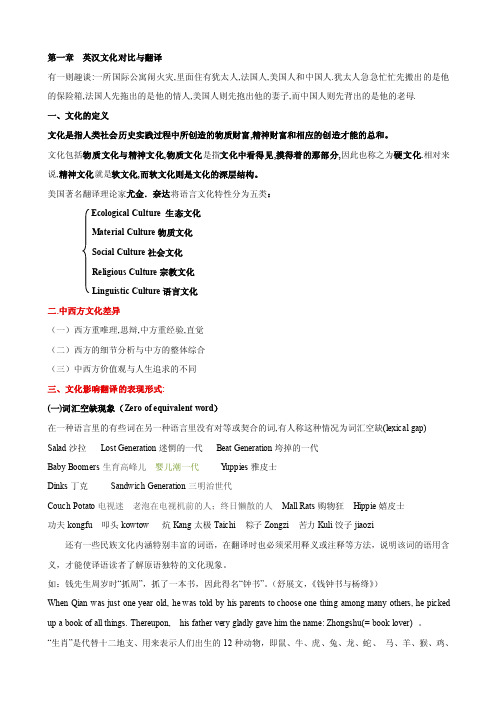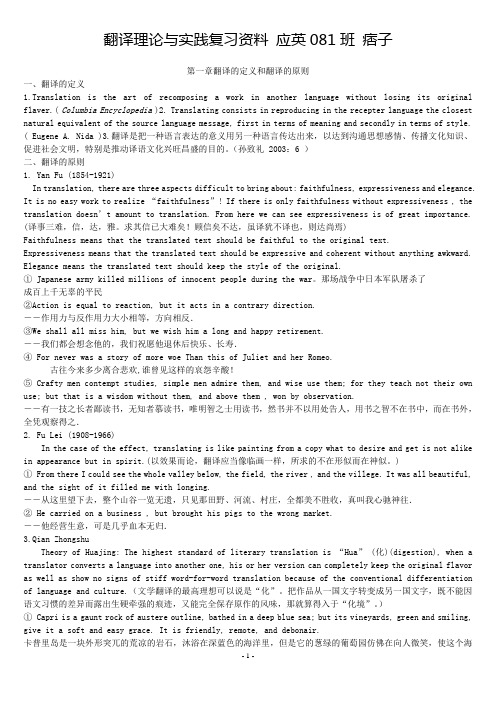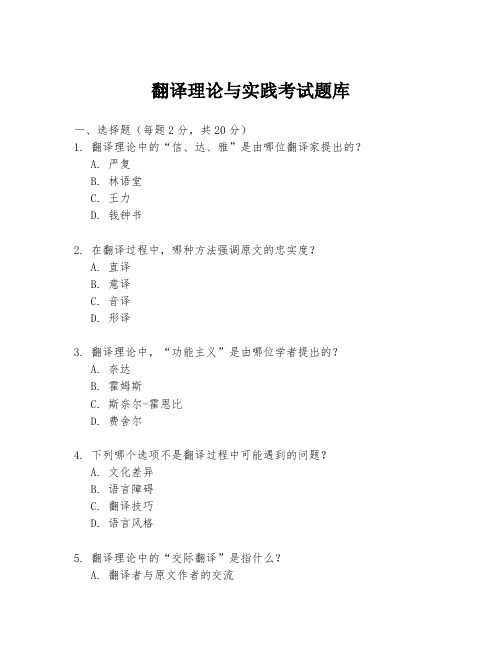翻译理论与实践
翻译理论与实践教案

翻译理论与实践教案一、教学目标1. 了解翻译的基本概念和理论框架。
2. 掌握翻译的基本技巧和方法。
3. 提高学生的翻译实践能力。
二、教学内容1. 翻译的定义和分类2. 翻译的基本原则3. 翻译的基本技巧和方法4. 翻译实践案例分析三、教学过程1. 导入:介绍翻译的基本概念和重要性。
2. 讲解:讲解翻译的定义和分类,翻译的基本原则,翻译的基本技巧和方法。
3. 实践:提供翻译实践案例,让学生进行翻译练习。
4. 讨论:分组讨论翻译实践案例,分享翻译心得和经验。
四、教学评价1. 课堂参与度:观察学生在课堂上的积极参与程度和表现。
2. 翻译练习:评估学生的翻译练习成果,包括准确性、流畅性和表达效果。
3. 小组讨论:评估学生在小组讨论中的表现,包括合作意识和沟通能力。
五、教学资源1. 教材:翻译理论与实践教材。
2. 案例材料:提供一些翻译实践案例供学生练习和讨论。
3. 多媒体设备:用于展示案例材料和进行课堂讲解。
六、教学策略1. 案例分析:通过分析具体翻译案例,让学生了解翻译理论和实践之间的联系。
2. 小组讨论:鼓励学生积极参与小组讨论,提高合作意识和沟通能力。
3. 角色扮演:模拟翻译场景,让学生扮演不同角色,提高实际操作能力。
4. 互动式教学:采用问答、解答等形式,激发学生思考,提高课堂参与度。
七、教学方法1. 讲授法:讲解翻译基本概念、理论和方法。
2. 实践法:让学生参与翻译实践,提高实际操作能力。
3. 讨论法:组织学生进行小组讨论,分享翻译心得和经验。
4. 反馈法:及时给予学生反馈,指导其改进翻译方法和技巧。
八、教学计划1. 课时安排:本课程共32课时,每课时45分钟。
2. 教学进度:按照教材内容,合理安排每个章节的教学进度。
3. 实践环节:每节课安排一定时间进行翻译实践,巩固所学知识。
4. 复习与测评:每章节结束后,进行复习和测评,确保学生掌握所学内容。
九、教学注意事项1. 关注学生个体差异:因材施教,满足不同学生的学习需求。
专业翻译理论与实践

专业翻译理论与实践一、引言专业翻译理论与实践是翻译工作者必备的核心能力。
本文将从翻译理论的基础知识、翻译实践中的问题与解决方案以及提升翻译技巧等三个方面进行探讨,以帮助读者深入了解翻译领域的知识与技能。
二、翻译理论的基础知识1.1 源语言与目标语言在翻译理论中,源语言是指需要翻译的原始语言,而目标语言则是翻译的结果语言。
翻译的过程中,需要将源语言的意思准确传达到目标语言中,同时注重语言差异和文化背景的处理。
1.2 等值翻译与意译等值翻译是指将源语言中的词语、结构、意义等等原样翻译到目标语言中,以保持原文的语义完整。
而意译则是在保持原文意思的基础上,根据目标语言的文化和习惯进行调整和转换。
1.3 文化因素的考虑翻译中的文化因素不可忽视。
在进行翻译时,需要了解源语言和目标语言所属的文化环境,以融入文化背景进行翻译,保证译文在目标语言的读者中产生良好的传达效果。
三、翻译实践中的问题与解决方案2.1 文本风格与语域在翻译过程中,不同的文本可能有不同的风格和语域,需要根据原文的特点和目标语言的要求进行适当调整。
对于正式场合的翻译,要遵循目标语言的正式语域和用词规范;对于口语化的文本,要注重目标语言的口语化表达方式。
2.2 语法和语言结构语法和语言结构是翻译中常见的问题之一。
不同语言的语法和结构有所不同,需要根据目标语言的语法规则进行调整和翻译。
在翻译过程中,需要注意语序、时态、语气等问题,以确保译文的准确性和流畅性。
2.3 多义词的翻译多义词在翻译中经常出现,如何正确理解并选择合适的翻译成为一个挑战。
需要根据上下文和语境进行判断,考虑多义词的不同含义,选择最合适的翻译方式。
四、提升翻译技巧的方法3.1 多语种学习想要成为优秀的翻译人员,掌握多语种是必不可少的。
学习更多的语言,可以拓宽视野,提高翻译的灵活性和准确性。
3.2 积累专业背景知识专业翻译领域需要了解不同领域的背景知识,如医学、法律、经济等。
积累相关领域的专业知识,可以更好地理解原文的意思,并进行准确的翻译。
翻译理论与实践课程概述

• 优秀译作
– 《简爱》、《傲慢与偏见》、《爱玛》、《德伯家的 苔丝》、《名利场》等文学著作译本; – 《中国翻译》等杂志刊登的优秀英译汉、汉译英文章; – 译林出版社《英语美文50篇》、青岛出版社《名作精 译》;张培基《英译中国现代散文选》(汉英对照);
• 翻译教材
翻译理论与实践课程概述翻译理论与实践非文学翻译理论与实践翻译理论与实践论文翻译理论与实践pdf翻译理论与实践试题翻译理论与实践教程广告翻译理论与实践高级翻译理论与实践翻译理论与实践的关系
翻译理论与实践
课程描述
• 一、课程定位与目标
“翻译理论与实践”是为英语专业高年级 学生开设的一门学科基础课,由英译汉和汉译 英两大课程模块组成。本课程在一定的翻译原 则指导和理论指引下,注重学生英/汉、汉/英 双向翻译训练和技巧积累,培养学生的翻译能 力。
• 四、课程教学方法与手段 课程教学方法与手段
1、以“读、写”带“译”,以“译”促 “读、写。 2、注重汉英比较。 3、组织翻译学习活动,重视优秀译作的 学习,鼓励学生参加各级各类翻译大赛。
– 参考文献
• 刘宓庆. 当代翻译理论. 北京:中国对外翻译出版公司, 1999 • Gentzler, Edwin. COntemporary Translation Theories.上海: 上海外语教育出版社,2004 • 王秉钦. 20世纪中国翻译思想史. 天津:南开大学出版社, 2004 • 吕俊. 翻译学----一个建构主义的视角.上海:上海外语教育出版 社,2006 • 冯庆华. 红译艺坛----《红楼梦》翻译艺术研究.上海:上海外语 教育出版社,2006. • 方梦之.译学词典.上海:上海外语教育出版社,2004 • 孙迎春.汉英双向翻译学语林.济南:山东大学出版社,2003 • • • • 国际译联 中国译协网/ 中国科学院科技翻译工作者协会/ 全国翻译专业资格(水平)考试网
翻译理论与实践.doc

第一章英汉文化对比与翻译有一则趣谈:一所国际公寓闹火灾,里面住有犹太人,法国人,美国人和中国人.犹太人急急忙忙先搬出的是他的保险箱,法国人先拖出的是他的情人,美国人则先抱出他的妻子,而中国人则先背出的是他的老母.一、文化的定义文化是指人类社会历史实践过程中所创造的物质财富,精神财富和相应的创造才能的总和。
文化包括物质文化与精神文化,物质文化是指文化中看得见,摸得着的那部分,因此也称之为硬文化.相对来说,精神文化就是软文化,而软文化则是文化的深层结构。
美国著名翻译理论家尤金.奈达将语言文化特性分为五类:Ecological Culture 生态文化Material Culture物质文化Social Culture社会文化Religious Culture宗教文化Linguistic Culture语言文化二.中西方文化差异(一)西方重唯理,思辩,中方重经验,直觉(二)西方的细节分析与中方的整体综合(三)中西方价值观与人生追求的不同三、文化影响翻译的表现形式:(一)词汇空缺现象(Zero of equivalent word)在一种语言里的有些词在另一种语言里没有对等或契合的词,有人称这种情况为词汇空缺(lexical gap) Salad沙拉Lost Generation迷惘的一代Beat Generation垮掉的一代Baby Boomers生育高峰儿婴儿潮一代Y uppies雅皮士Dinks丁克Sandwich Generation三明治世代Couch Potato电视迷老泡在电视机前的人;终日懒散的人Mall Rats购物狂Hippie嬉皮士功夫kongfu叩头kowtow 炕Kang太极Taichi粽子Zongzi苦力Kuli饺子jiaozi 还有一些民族文化内涵特别丰富的词语,在翻译时也必须采用释义或注释等方法,说明该词的语用含义,才能使译语读者了解原语独特的文化现象。
如:钱先生周岁时“抓周”,抓了一本书,因此得名“钟书”。
翻译理论与实践教案

一、教案基本信息教案名称:翻译理论与实践教案课时安排:2课时教学目标:1. 了解翻译的基本概念和理论;2. 掌握翻译的基本技巧和方法;3. 提高学生的翻译实践能力。
教学内容:1. 翻译的概念与分类;2. 翻译的基本原则;3. 翻译的基本技巧和方法;4. 翻译实践。
教学准备:1. 教材或教学资源;2. 投影仪或白板;3. 练习材料。
教学过程:第一课时:一、导入(5分钟)教师通过引入一些有趣的翻译案例,引发学生对翻译的兴趣,简要介绍本节课的教学目标和内容。
二、翻译的概念与分类(10分钟)1. 教师讲解翻译的定义和基本概念;2. 学生了解翻译的分类,包括直译、意译、编译等。
三、翻译的基本原则(10分钟)1. 教师介绍翻译的基本原则,如忠实于原文、保持原文的风格和特点等;2. 学生理解并掌握翻译的基本原则。
四、翻译的基本技巧和方法(15分钟)1. 教师讲解翻译的基本技巧和方法,如词汇翻译、句子结构翻译等;2. 学生通过实例学习并练习翻译技巧和方法。
第二课时:一、复习与导入(5分钟)1. 教师带领学生复习上节课所学的翻译概念、分类和原则;2. 学生通过复习加深对翻译知识的理解。
二、翻译实践(20分钟)1. 教师提供一些翻译练习材料,包括中文和英文原文;2. 学生根据所学的翻译技巧和方法,进行翻译练习;3. 教师对学生的翻译进行指导和反馈。
三、总结与拓展(10分钟)1. 教师对本节课的学习内容进行总结;2. 学生提出问题或分享自己的学习心得;3. 教师提供一些拓展阅读或练习,鼓励学生进一步学习和发展翻译能力。
教学评价:1. 观察学生在课堂上的参与程度和理解程度;2. 评估学生的翻译练习成果;3. 收集学生的反馈意见,不断改进教学方法和内容。
二、翻译与文化教案课时安排:2课时教学目标:1. 了解翻译与文化之间的关系;2. 掌握文化因素在翻译中的处理方法;3. 提高学生的跨文化交际能力。
教学内容:1. 翻译与文化的关系;2. 文化因素在翻译中的处理方法;3. 跨文化交际能力的培养。
翻译理论与实践教案

翻译理论与实践教案一、教学目标1. 让学生了解翻译的基本概念和理论,包括翻译的定义、类型和原则。
2. 使学生掌握翻译的基本技巧和方法,如直译、意译、归化、异化等。
3. 培养学生具备一定的翻译实践能力,能够进行简单的英汉互译。
4. 提高学生对文化差异的敏感性,使其能够在翻译过程中注意到文化因素的影响。
二、教学内容1. 翻译的基本概念和理论翻译的定义翻译的类型(如文学翻译、科技翻译、商务翻译等)翻译的原则(如忠实于原文、保持原文风格、传达原文意义等)2. 翻译的基本技巧和方法直译和意译归化和异化词义转换语义增减句子结构调整3. 翻译实践英汉互译练习翻译案例分析翻译错误分析4. 文化差异与翻译语言与文化差异文化背景知识的重要性翻译中的文化适应与调整三、教学方法1. 讲授法:讲解翻译的基本概念、理论和方法。
2. 实践法:进行英汉互译练习,引导学生运用所学技巧和方法。
3. 案例分析法:分析翻译案例,讨论翻译中的问题和策略。
4. 小组讨论法:分组进行讨论,促进学生间的交流与合作。
四、教学评估1. 课堂参与度:观察学生在课堂上的发言和讨论情况。
2. 练习完成情况:检查学生完成的英汉互译练习的质量。
3. 翻译案例分析报告:评估学生对翻译案例的分析能力和见解。
4. 期末考试:设置翻译相关的试题,测试学生的理论知识和实践能力。
五、教学资源1. 教材:翻译理论与实践教材。
2. 参考书籍:翻译理论著作、翻译案例集等。
3. 网络资源:翻译相关网站、论坛、文章等。
4. 多媒体教学设备:投影仪、计算机等。
六、教学计划1. 课时安排:本课程共32课时,每课时45分钟。
2. 课程安排:每周两次课,每次课时长为1小时30分钟。
七、教学进程1. 第一阶段(2周):介绍翻译的基本概念和理论,讲解翻译的定义、类型和原则。
2. 第二阶段(3周):讲解翻译的基本技巧和方法,如直译、意译、归化、异化等。
3. 第三阶段(4周):进行翻译实践,包括英汉互译练习、翻译案例分析和翻译错误分析。
翻译理论与实践 (文稿)

翻译理论与实践复习资料应英081班痞子第一章翻译的定义和翻译的原则一、翻译的定义1.Translation is the art of recomposing a work in another language without losing its original flaver.( Columbia Encyclopedia)2. Translating consists in reproducing in the recepter language the closest natural equivalent of the source language message, first in terms of meaning and secondly in terms of style. ( Eugene A. Nida )3.翻译是把一种语言表达的意义用另一种语言传达出来,以达到沟通思想感情、传播文化知识、促进社会文明,特别是推动译语文化兴旺昌盛的目的。
(孙致礼 2003:6 )二、翻译的原则1. Yan Fu (1854-1921)In translation, there are three aspects difficult to bring about: faithfulness, expressiveness and elegance. It is no easy work to realize “faithfulness”! If there is only faithfulness without expressiveness , the translation doesn’t amount to translation. From here we can see expressiveness is of great importance. (译事三难,信,达,雅。
求其信已大难矣!顾信矣不达,虽译犹不译也,则达尚焉)Faithfulness means that the translated text should be faithful to the original text.Expressiveness means that the translated text should be expressive and coherent without anything awkward. Elegance means the translated text should keep the style of the original.① Japanese army killed millions of innocent people during the war。
翻译理论与实践

通过众包平台邀请多人对译文进行评估,以获得更全面、客观的评估结果。众包评估可以降低成本,提 高效率,但需要注意评估人员的专业性和质量控制。
提高翻译质量的途径
提高语言能力
加强源语言和目标语言的学习,提高语言水平, 包括词汇、语法、句式和修辞等方面的能力。
掌握翻译技巧
学习和掌握各种翻译技巧和方法,如增译、减译 、转译、分译等,以提高翻译的准确性和流畅性 。
文化传递
在翻译过程中注意文化的传递,尽可能保留 原文的文化特色,同时考虑目标读者的文化 接受度。
03
翻译质量评估标准与方法
翻译质量评估标准介绍
01
02
03
准确性
译文是否准确传达了原文 的含义,包括词汇、语法 、句式和修辞等方面的准 确性。
流畅性
译文是否通顺流畅,符合 目标语言的表达习惯,易 于理解和接受。
翻译理论与实践
汇报人:XX
目 录
• 翻译理论概述 • 翻译实践技巧探讨 • 翻译质量评估标准与方法 • 机器翻译技术与应用前景 • 口译实践与技巧分享 • 翻译行业现状与未来发展趋势
01
翻译理论概述
翻译的定义与本质
翻译的定义
翻译是将一种语言中的文本转换成另 一种语言中的等效文本的过程,涉及 语言、文化、交际等言的文化背景,包括历史 、文化、社会、政治等方面的知识,以避免文化 冲突和误解。
使用辅助工具
利用计算机辅助翻译(CAT)工具、机器翻译( MT)工具等辅助工具,提高翻译效率和质量。同 时需要注意对辅助工具的使用方法和局限性有充 分了解。
04
机器翻译技术与应用前景
机器翻译技术原理简介
翻译行业面临的挑战与机遇
挑战
翻译理论与实践(全套)精品PPT课件

导学——课程要求
Tests: 60% There will be only one test: a final. But there may also be
Main Language points: 1. Comparative studies of language family 2. Comparative studies of word building in English and
Chinese 3. Comparative studies of syllable
Exercise
5
第三章:词语的翻译
教学目的:旨在帮助学生了解词义的多样性 (引申、褒贬);并掌握词语翻译的选词技巧。
教学内容: 1. 词义的选择 2. 词义的引申 3. 词义的褒贬 4. 翻译练习
6
第四章:句子翻译技巧(上)
一、教学目的:要求熟练理解句子的翻译技 巧,从而在英汉翻译时做到通顺、准确。
教学内容: 1. 翻译的定义、分类 2. 翻译的标准 3. 翻译的过程:理解——表达——校对 4. 中、西译史
练习
4
第二章:英汉语言现象对比
Teaching aims: to learn about the similarities and differences of Chinese and English in word forming and vocabulary so as to translate them accurately.
二、教学过程:
1. 增译法 2. 省译法 3. 词类转换 4. 正说反译、反说正译法 5. 翻译练习1、2、3、4
7
第五章:句子翻译技巧(下)
一、教学目的:要求熟练理解句子的翻译技 巧,从而在汉英翻译时做到通顺、准确。
《翻译理论与实践》课件

语言中蕴含的情感色彩是语用意义的重要组成部分,译者需要关注原文的情感色彩,并在译文中进行适 当的表达,以实现语用意义的完整传递。
语用等效与翻译策略
语用等效原则
在翻译过程中,译者应遵循语用等效原则,确保译文在目 标语言中产生与原文相同的效果,包括语言功能、语用意 义和修辞效果等方面。
翻译策略的选择
总结词
遵循法律文件的严谨性
详细描述
商务合同的翻译实践需遵循法律文件的严谨性。译者应仔 细核对原文,确保译文的准确性和完整性,避免因疏忽而 产生的法律风险。同时,在遇到法律术语时,译者应进行 深入研究,确保译文的准确性和专业性。
新闻报道的翻译实践
总结词
时效性是新闻报道的生命线
详细描述
新闻报道的翻译实践要求时效性极强,因为新闻报道需要 及时传递给目标语读者。在翻译过程中,译者应快速准确 地完成翻译工作,确保新闻报道的时效性不受影响。
为实现语用等效,译者需要根据具体情况选择合适的翻译 策略,如直译、意译、增译、减译等,以准确传达原文的 语用意义。
语用等效的评价
评价译文是否达到语用等效,需要考虑译文在目标语言中 的可接受度、表达的自然度以及读者反馈等因素,以确保 翻译质量。
05
翻译中的语言规范与风 格
语言规范与翻译
语言规范
在翻译过程中,需要遵循目标语言的语法、词汇和表 达习惯,以确保译文准确、流畅。
VS
异化
以源语文化为归宿,保留原文的异国情调 和文化特色,让译文读者了解不同文化。
增译与减译
增译
在翻译过程中,根据目标语的语言习惯和表达方式,增加一些词语或短语,以使译文更加完整、流畅 。
减译
在翻译过程中,删减原文中一些不必要的词语或短语,使译文更加简洁、明了。
翻译理论与实践

B: each language has its own system of symbolizing meaning
man
沈阳
(1) one-for-many relationship between language
《翻译理论与实践》 第一章 第二章 翻译的重点从语言形式转向读者反应 动态对等的理论
之后几章 翻译的过程—分析、转换、重组、检 测 检验 原文 译文 分析 转换 重组
奈达翻译思想的三个阶段
一:描写语言学阶段
重点是语言的句法现象和词法现象
二:交际理论阶段 三:社会符号学阶段
科学
交际
动态对等
翻译过程
Reproducing the message Translating must aim primarily at “reproducing the message”. To do anything else is essentially false to one’s task as a translator.(p.12)
Spanish: llave
(3) Languages have different ways of classification.
e.g. in some languages one can speak of bamboo as a tree, as we do in English, but in many languages bamboo is only “grass”.
口头形式优于书面形式
(《圣经》)
1. Capitalization is not sufficient to correct the meaning of otherwise ambiguous or misleading translation. 2. One must not depending upon the spelling to correct otherwise misleading pronunciations. 3. Terms which are vulgar in pronunciation should not be used in the text, even when the written form does not seem vulgar. 4. The punctuation should not be employed in an arbitrary manner to correct otherwise misleading grammatical arrangements.
浅谈翻译理论与实践

浅谈翻译理论与实践当今的世界,是一个开放的世界,各国在政治、经济、文化、体育、教育等各方面交流日益频繁和加深,在各国间的交流中,翻译已成为不可或缺的交际途径,翻译活动越来越频繁。
因此,对于翻译工作者来说,翻译是一项实践性很强的语言活动。
如果只有翻译实践没有翻译理论,那翻译水平就得不到提高。
实践是理论的基础,没有理论指导的实践是无源之水,没有实践证明的理论是无本之木。
这要求我们语言学习者对中西翻译发展的历史阶段有正确、清楚地认识是极为重要的。
本文对中西方翻译历史阶段及其翻译理论做了简洁地概括,旨在能对翻译工作者和翻译专业本专科生起到引导作用,帮助他们入门。
一带一路的战略构想体现了我国对外开放时发生的战略转移。
对外开放和国际上的合作交流都需要语言为桥梁,语言翻译便显得非常重要。
标签:翻译理论;翻译实践活动;中西翻译名家(一)那么人类为何会有翻译这样一种活动呢?在西方社会,人们认为翻译之出现,其重要原因在于人类的巴别塔情节。
《圣经·旧约·创世记》第11章提到,当时人类联合起来兴建希望能通往天堂的高塔;为了阻止人类的计划,上帝让人类说不同的语言,使人类相互之间不能沟通,计划因此失败,人类自此各散东西,建造通天塔的工程,也不得不搁置。
即便如此统一语言,达到沟通无障碍,这也一直是人类的一个夙愿。
获得奥斯卡提名的影片——Babel,(巴别塔)就是讲的贯穿在不同时间,不同地点和不同语言之间的人的故事。
影片的结束语写到”the brightest light in the darkest night”.寓意着即便是在沟通困难重重的环境下,人类还是克服一切阻力来达到信息传递和交流。
在中国,最早的翻译起源于《越人歌》的翻译,相传是中国第一首译诗。
鄂君子皙泛舟河中,打桨的越女爱慕他,用越语唱了一首歌,歌词中唱到“山有木兮木有枝,心悦君兮君不知”鄂君请人用楚语译出,就是这一首美丽的情诗。
有人说鄂君在听懂了这首歌,明白了越女的心之后,就微笑着把她带回去了。
翻译理论与实践(全套)PPT课件

导学——课时安排
课时安排:
教学内容
导学
第一章:翻译概述
第二章:英汉语言对比 第三章:词语的翻译
第四章:句子翻译技巧(上) 第五章:句子翻译技巧(下) 第六章:常见文体的翻译
注:可能 因授课实际情况,课时安排会做适当调整。
课时 2 2 2 2 2 2 4
14
导学——学法指导
译者素养:
➢译者的素质: 外语素质 语言敏感度 心理素质
导学——课程要求
Tests: 60% There will be only one test: a final. But there may also be
several short quizzes through the term. Attendance: 20%
Daily attendance will be recorded. Each time a student will get 2.5 points. 1point for attendance, 1 point for being on time, and 0.5 point for participating in discussion and interacting positively with fellow classmates.
二、教学过程:
1. 增译法 2. 省译法 3. 词类转换 4. 正说反译、反说正译法 5. 翻译练习1、2、3、4
7
第五章:句子翻译技巧(下)
一、教学目的:要求熟练理解句子的翻译技 巧,从而在汉英翻译时做到通顺、准确。
二、教学过程:
1. 重译法 2. 语态变换法 3. 词序调整法 4. 拆译法 5. 翻译练习1、2、3、4
We should take considerable ( or a good portion of ) responsibility for the problems that arouse. 19
翻译理论与实践考试题库

翻译理论与实践考试题库一、选择题(每题2分,共20分)1. 翻译理论中的“信、达、雅”是由哪位翻译家提出的?A. 严复B. 林语堂C. 王力D. 钱钟书2. 在翻译过程中,哪种方法强调原文的忠实度?A. 直译B. 意译C. 音译D. 形译3. 翻译理论中,“功能主义”是由哪位学者提出的?A. 奈达B. 霍姆斯C. 斯奈尔-霍恩比D. 费舍尔4. 下列哪个选项不是翻译过程中可能遇到的问题?A. 文化差异B. 语言障碍C. 翻译技巧D. 语言风格5. 翻译理论中的“交际翻译”是指什么?A. 翻译者与原文作者的交流B. 翻译者与目标语言读者的交流C. 原文与译文的交流D. 原文与目标语言的交流6. 翻译理论中的“动态对等”是由哪位学者提出的?A. 奈达B. 霍姆斯C. 斯奈尔-霍恩比D. 费舍尔7. 在翻译实践中,哪种翻译策略更注重原文的文化内涵?A. 直译B. 意译C. 音译D. 形译8. 翻译理论中的“交际翻译”主要强调的是什么?A. 原文的忠实度B. 译文的流畅性C. 译文的可读性D. 译文的交际功能9. 翻译理论中的“翻译单位”通常指的是什么?A. 词汇B. 句子C. 段落D. 文章10. 在翻译实践中,哪种翻译方法更注重译文的可读性?A. 直译B. 意译C. 音译D. 形译二、简答题(每题10分,共30分)1. 简述翻译理论中的“交际翻译”与“语义翻译”的区别。
2. 描述翻译过程中如何处理文化差异,并举例说明。
3. 阐述翻译理论中的“功能主义”对翻译实践的影响。
三、论述题(每题25分,共50分)1. 论述翻译理论中的“动态对等”理论,并结合实际翻译案例进行分析。
2. 论述翻译实践中如何处理语言风格的差异,并给出具体的翻译策略。
四、翻译实践题(共30分)请将以下中文段落翻译成英文,并注意保持原文的语义、风格和文化内涵。
原文:随着全球化的不断深入,跨文化交流变得越来越重要。
翻译作为跨文化交流的重要工具,不仅要忠实于原文,还要考虑到目标语言的文化背景和读者的接受能力。
翻译理论与实践的关系及其结合的方式

结论
总的来说,翻译理论源于多个领域,包括传统文化、宗教、语言等。这些理论 的形成和发展都是基于对翻译实践的总结和反思。翻译理论在各个领域的翻译 实践中都有所应用,为翻译实践提供了有力的指导。翻译理论也存在一些争议, 需要我们进一步研究和探讨。未来,随着科技的发展和社会的进步,翻译理论 将会有更多的可能性,也会为翻译实践带来更多的指导。
翻译理论与实践相结合的方式
翻译理论与实践的结合主要体现在以下几个方面:
1、以理论为指导,开展翻译实践。在翻译实践中,译者需要以相关理论为指 导,对原文进行深入分析,理解原文的语义、文化背景和修辞特点等方面的内 容,从而更好地进行语言转换。
2、结合多种理论,制定翻译策略。针对不同的翻译实践,译者可以结合多种 相关理论,制定合适的翻译策略,如直译、意译、归化和异化等,以实现最佳 的翻译效果。
2、学科交叉结合原则。翻译教材编写应与其他学科领域相结合,如语言学、 文化学、计算机科学等,以便学生能够全面了解翻译涉及的各种因素和技巧。
3、可持续发展原则。翻译教材应考虑学生的长期发展需求,不仅涵盖基本的 翻译理论和技巧,还应翻译学科的前沿动态和发展趋势,使学生能够适应不断 变化的翻译市场需求。
理论的争议
尽管翻译理论在实践中有着广泛的应用,但也存在一些争议。主要集中在以下 几个方面:一、翻译理论是否应该语言本身,还是应该文化、社会、政治等因 素;二、翻译理论是否具有普遍性,即是否适用于不同语言之间的翻译;三、 翻译理论是否应该注重译者的主观感受,还是应该注重目标语言读者的接受程 度。这些争议促使人们对翻译理论进行更深入的研究和探讨,从而推动翻译理 论的不断完善和发展。
理论分析
翻译理论是对翻译实践的总结和升华,它反映了翻译的规律和本质,为翻译实 践提供了指导和支持。翻译理论包括语言学、文学、文化等多个方面的知识, 以及翻译技巧、翻译策略和翻译批评等方面的内容。这些理论知识对翻译实践 具有重要的指导意义,可以帮助译者更好地理解原文,把握好目标语言的表达 特点,提高翻译的准确性。
英汉翻译理论与实践

分句法与合句法
分句法
分句法是指将英文中的一个长句拆分成 两个或多个短句进行翻译,以使译文更 加符合汉语的表达习惯。例如,“He is a good singer and dancer”可以拆分 成“他是一个好歌手”和“他是一个好 舞者”。
VS
合句法
合句法是指将英文中的两个或多个短句合 并成一个长句进行翻译,以使译文更加流 畅、紧凑。例如,“She is a doctor and she is also a writer”可以合并翻译 为“她既是一名医生,也是一名作家”。
意译
意译是按照原文的含义和精神进行翻译,不拘泥于原文的词序和结构。在意译时,需要摆脱原文的语 言束缚,用自然、流畅的语言表达原文的含义,同时保持译文的完整性和连贯性。
增译与减译
增译
增译是指在翻译过程中,根据原文的含义和语境,增加一些 必要的词语、短语或句子,以使译文更加完整、流畅和准确 。增译通常用于弥补原文的省略、补充背景信息、解释文化 概念等。
句子结构问题
总结词
句子结构问题是英汉翻译中的重要问题之一。
详细描述
由于英汉两种语言的句子结构存在较大差异,因此在进 行英汉翻译时,需要进行必要的句子结构调整。例如, 英语中常用长句和复合句,而汉语中则常用短句和简单 句。在进行英汉翻译时,需要将英文的长句和复合句拆 分成汉语的短句和简单句,或者将汉语的短句和简单句 整合成英文的长句和复合句。
商务翻译
总结词
商务翻译涉及商业、法律、合同等领域的文 本,要求准确、专业、规范。
详细描述
商务翻译要求译者具备相关领域的专业知识 ,能够准确理解并表达原文的含义。在翻译 过程中,译者需特别注意语言的严谨性和规 范性,以确保译文的准确性和合法性。同时 ,商务翻译还强调译文的流畅性和易读性,
- 1、下载文档前请自行甄别文档内容的完整性,平台不提供额外的编辑、内容补充、找答案等附加服务。
- 2、"仅部分预览"的文档,不可在线预览部分如存在完整性等问题,可反馈申请退款(可完整预览的文档不适用该条件!)。
- 3、如文档侵犯您的权益,请联系客服反馈,我们会尽快为您处理(人工客服工作时间:9:00-18:30)。
This article was downloaded by: [Beijing Normal University]On: 13 March 2015, At: 23:54Publisher: RoutledgeInforma Ltd Registered in England and Wales Registered Number: 1072954 Registeredoffice: Mortimer House, 37-41 Mortimer Street, London W1T 3JH, UKClick for updatesCurrent Issues in T ourismPublication details, including instructions for authors and subscription information:/loi/rcit20The interaction between tourism and FDI in real estate in OECD countriesHassan Gholipour Fereidouni a& Usama Al-mulalibaSchool of Management, Universiti Sains Malaysia, Penang,MalaysiabEconomic Programe, Universiti Sains Malaysia, Penang, Malaysia Published online: 30 Oct 2012.PLEASE SCROLL DOWN FOR ARTICLETaylor & Francis makes every effort to ensure the accuracy of all the information (the “Content”) contained in the publications on our platform. However , Taylor & Francis,our agents, and our licensors make no representations or warranties whatsoever as to the accuracy, completeness, or suitability for any purpose of the Content. Any opinions and views expressed in this publication are the opinions and views of the authors,and are not the views of or endorsed by Taylor & Francis. The accuracy of the Content should not be relied upon and should be independently verified with primary sources of information. Taylor and Francis shall not be liable for any losses, actions, claims,proceedings, demands, costs, expenses, damages, and other liabilities whatsoever or howsoever caused arising directly or indirectly in connection with, in relation to or arising out of the use of the Content.This article may be used for research, teaching, and private study purposes. Any substantial or systematic reproduction, redistribution, reselling, loan, sub-licensing,D o w n l o a d e d b y [B e i j i n g N o r m a l U n i v e r s i t y ] a t 23:54 13 M a r c h 2015CURRENT ISSUES IN TOURISM LETTERThe interaction between tourism and FDI in real estate in OECD countriesHassan Gholipour Fereidouni a ∗and Usama Al-mulali baSchool of Management,Universiti Sains Malaysia,Penang,Malaysia;b Economic Programe,Universiti Sains Malaysia,Penang,Malaysia(Received 17July 2012;final version received 5September 2012)The purpose of this article is to investigate the empirical link between foreign direct investment (FDI)in real estate sector (FDIRE)and international tourism (TOUR).Panel co-integration and panel Granger causality techniques are applied to analyse both long-and short-run relationships for the case study of selected OECD countries.Our empirical results show the existence of the long-run and a bi-directional causal relationship between FDIRE and TOUR.The results provide some implications for policy-makers.Keywords:FDI in real estate;tourism flows;panel cointegration;OECD countriesIntroductionIn recent years,there has been a growing interest in analysing the relationship between foreign direct investments (FDI)and tourism (Craigwell &Moore,2007;Kundu &Con-tractor,1999;Sanford &Dong,2000;Selvanathan,Selvanathan,&Viswanathan,2009;Tang,Selvanathan,&Selvanathan,2007).This literature proposes several explanations for the links between these variables.On the one hand,the relationship by which tourism affects FDI can be explained as follows.International tourism (TOUR)allows potential investors to experience first-hand the environment of the country being visited and to obtain information about the available investment opportunities.By experiencing the country’s goods and services,opportunities for investment may be identified (Sanford &Dong,2000).Moreover,firms’FDI decisions require detailed information about the host country’s competitors,regulatory environment,work ethic,and culture.Tourism improves on existing research into FDI and as a result it can contribute to the expansion of new FDI in host country (Sanford &Dong,2000).On the other side,the causality nexus in the sense FDI causes tourism can appear since foreign investors provide the tourism capacity that the country is lacking,by building more hotels and tourism attractions (such as theme park)and improving the transport facilities,which then stimulates or allows the country to accommodate a larger number of visitors (Craigwell &Moore,2007;Tang et al.,2007).Another link from FDI to tourism is through business tourists.Business tourists are entrepreneurs and managers from other countries who,while looking for opportunities to invest in host country as well as to promote and sustain business in host country,visit several tourist destinations (Selvanathan et al.,2009).In fact,more FDI inflow could generate a cyclical effect of investigative business and holiday travel,resulting in greater tourism (Tang et al.,2007).Current Issues in Tourism ,2014V ol.17,No.2,105–113,/10.1080/13683500.2012.733359D o w n l o a d e d b y [B e i j i n g N o r m a l U n i v e r s i t y ] a t 23:54 13 M a r c h 2015While there has been a series of articles that examined the relationship between tourism and aggregate FDI,very few empirical studies have examined the relationship between FDI in real estate (FDIRE)and tourism.In fact,the question of the relationship between tourism and FDIRE has only recently started to be addressed in the empiricalliterature.For example,Gholipour and Masron (2011)and Rodrı´guez and Bustillo (2010)found that tourism agglomeration in a host country is a significant and major determinant of FDIRE.In another study,Sanford and Dong (2000)showed that tourism has a positive and significant impact on new FDI.However,no empirical studies have examined the direction of causality between FDIRE and tourism.To address the knowledge gap,this study investigates the short-run and the long-run dynamic interactions between FDREI and TOUR in OECD countries using cointegration and Granger causality tests.OECD countries have been chosen for the present study due to the availability of data for FDIRE and low restriction on foreign investment in real estate sectors.In addition,OECD countries are among the most important tourism des-tinations in the world.There are two ways that tourism can cause FDIRE.First,investment in real estate by foreigners in a host country is influenced by the acquisition of information about the attrac-tiveness of host country as a holiday destination.Thus,tourism can be considered as the firststep before acquiring a property abroad (Rodrı´guez &Bustillo,2010)because foreign investors may identify property investment opportunities that could lead to property trans-actions in following periods.Second,FDI in real estate development and investment follows their customers (international tourists)when choosing locations for investments (He,Wang,&Cheng,2009).On the other hand,the increased FDIRE (in particular foreign investment in residential properties)raises tourism in the host countries becausetourism is the next step after acquiring a property in a foreign country (Rodrı´guez &Bus-tillo,2010).Moreover,foreign real estate foreign investors provide tourism capacity such as hotels and tourism attractions and improve the transport facilities,which then stimulates or allows the country to accommodate a larger number of visitors (Craigwell &Moore,2007;Tang et al.,2007).The analysis of the relationship between tourism and FDIRE is relevant for at least two reasons.First,recent research finds that FDIRE and tourism have encouraged the economic development in many countries (Cortes-Jimenez &Pulina,2010;Ning &Yu,2009).For that reason,the study of the potential complementary relationship between flows of investments in real estate and TOUR is of major interest,as it can promote economic growth.Second,this relationship is of particular relevance for policy-makers since several observers suggest that one of the main requirements of real estate recovery after 2008financial crisis is tourism recovery (Jones Lang LaSalle,2009).Our article also contributes to the literature in two ways.First,although several articles provide evidence supporting a relationship between FDIRE and tourism,these articles focus their analyses on FDIRE inflows (FDIREI).However,there are no articles that study this relationship considering FDIREI,FDIRE outflows (FDIREO)and tourism arrival and departure at the same time.Second,previous studies used time-series analyses to investigate the causality between FDIRE and tourism.In the present study,we apply panel cointegration techniques to study the short-and long-run nexus between two flows.The article is organised as follows.Section 2presents some facts for the tourism and FDIRE in OECD countries.Section 3explains the data and the source of data.Section 4discusses the methodology and presents the empirical results.Finally,in Section 5,some 106H.G.Fereidouni and U.Al-mulaliD o w n l o a d e d b y [B e i j i n g N o r m a l U n i v e r s i t y ] a t 23:54 13 M a r c h 2015Tourism and FDI in real estate in OECD countriesThis section presents some facts for the tourism and FDIRE in OECD countries.Tourism is a key component of the service economy,which is growing in most OECD countries as these societies become more mobile and prosperous.During the period from 1995to 2009,the number of international tourist arrival and departure increased across much of the OECD countries.Figures 1and 2illustrate the evolution of international tourist arrival and departure for a set of OECD countries.In terms of revenues,OECD countries generate about 70%ofworld tourism activity (Santana-Gallego,Ledesma-Rodrı´guez,&Pe ´rez-Rodrı´guez,2011).Moreover,tourism GDP accounts for up to 11%of GDP and even more in terms of employment in 2010in the OECD area (OECD,2010).Table 1shows the evolution of FDIRE (FDIREI and FDIREO)for a set of OECD countries.The last two decades have witnessed a growth in FDIRE across much of OECD countries.It is largely due to the regional and international economic integration,continued privatisation,liberalisation of investment regimes,protection and promotion of FDI as well as maturity of their real estate markets (in terms of higher levels of liquidity,superior return,and diversification).The growth is more apparent in less-developed OECD countries such as South Korea,Turkey,Hungary,and Poland.DataThe analysis comprises the period 1995–2009for a sample of 24OECD countries.OECD countries have been chosen for the present study due to the availability of data forFDIREFigure 1.Evolution of tourist arrivals,1995–2009(millions).Source:World Development Indicators of the WorldBank.Figure 2.Evolution of tourist departures,1995–2009(millions).Current Issues in Tourism 107D o w n l o a d e d b y [B e i j i n g N o r m a l U n i v e r s i t y ] a t 23:54 13 M a r c h 2015and low restriction on foreign investment in real estate sectors.Moreover,OECD countries are among the most important tourism destinations in the world.The choice of the sample period and country is mainly conditioned by the availability of FDI in real estate data.We use annual data for the following countries:Austria,Belgium,Czech,Denmark,Estonia,Finland,France,Germany,Greece,Hungary,Japan,Luxembourg,Mexico,Netherland,Norway,Poland,Slovakia,Slovenia,South Korea,Spain,Sweden,Turkey,UK,and USA.Data relating to the FDI in real estate inflows and outflows are obtained from the OECD Inter-national Direct Investment Database.Tourism data (annual international tourist arrivals and departures)are obtained from World Development Indicators of the World Bank.Methodology and resultsThe purpose of this study is to investigate the relationship between FDI in real estate (FDIRE),FDIREI and FDIREO and international tourist (TOUR),international tourist arri-vals (TOURA)and international tourist departures (TOURD)amongst the OECD countries.With this objective,first we analyse cointegration and then the short-run causality between variables is explored using the Granger causality test.The specification for the variables can be written as follows:FDIRE it =a it +b 1TOUR it +1it ,(1)TOUR it =a it +b 2FDIRE it +1it ,(2)FDIREI it =a it +b 3TOURA it +1it ,(3)TOURA it =a it +b 4FDIREI it +1it ,(4)FDIREO it =a it +b 5TOURD it +1it ,(5)TOURD it =a it +b 6FDIREO it +1it ,(6)Table 1.Evolution of FDIREI and FDIREO a (millions of US$).Country199720022007FDIREIFDIREO FDIREIFDIREO FDIREI FDIREO France 3849.76367.601724.622407.1220,091.7118,590Germany 2596.8076.652125.341088.493849.4121867.21Japan398.345611.57232.321403.531440.23156.25South Korea 4193.11108.7n.a.729.81355.91Netherland 1059.52823.452186.411991.3321107.46533.88Spain 445.45254.541456.97303.452042.436403.83UK 2131.042321.042180.01127.512590.351600.96USA39622571987227626694160a“Negative values of FDI net inflows for a particular year show that the value of disinvestment by foreign investors was more than the value of capital newly invested in the reporting economy.Negative values of FDI net outflows show that the value of direct investment made by domestic investors to external economies was less than the value of repatriated (disinvested)direct investment from external economies”.Retrieved from:/esa/sustdev/natlinfo/indicators/methodology_sheets/global_econ_partnership/fdi.pdf.Source:OECD International Direct Investment Database.108H.G.Fereidouni and U.Al-mulaliD o w n l o a d e d b y [B e i j i n g N o r m a l U n i v e r s i t y ] a t 23:54 13 M a r c h 2015where FDIRE is the sum of inflows and outflows of FDI in and to real estate,1FDIREI is FDI inflows to real estate,FDIREO is FDI outflows to real estate,TOUR denotes the total number of international tourists,TOURA represents the international tourist arrival,and TOURD is the international tourist departure.b 1,b 2,b 3,b 4,b 5,and b 6are the slope coefficients of the model,t is time,i is the cross-sectional unit (i th country)and a is a scalar.Panel unit root testsPanel unit root tests are a generalisation of the augmented Dickey–Fuller (ADF)individual country unit root tests to a common panel unit root test.The basic panel unit root test regression can be written as follows:y it =r i y it −1+X it d i +1it ,(7)where i ¼1,2,.....,N cross-section units or series that are observed over periods t ¼1,2,....,T i .The X it is the exogenous variables in the model,including any fixed effects or individual trend,r i are the autoregressive coefficients,and the error 1it are assumed to be mutually independent of individual disturbance.Two types of panel unit root tests,namely Im,Pesaran and Shin (IPS)and the ADF–Fisher chi-square are used in this study.IPS devised a testing method based on the aver-aging individual unit root test ADF test statistics.The null hypothesis of this test is that each series in the panel contains a unit root test,while the alternative hypothesis allows for some of the individual time series to have unit roots.The ADF–Fisher chi-square pro-posed by Wu and Choi combines the p -values from unit root tests.In this way,the cross-section dimension N can be either finite or infinite.Each group can have different types of non-stochastic components.The time-series dimension T can be different for each I ,and the alternative hypothesis would allow some groups to have unit roots while others would not (Baltagi,2009).Both unit root tests work on the assumption that allows r i to vary freely across cross-section.Table 2shows the panel unit root test results for the IPS and ADF–Fisher chi-square.The results reveal that all the variables are not stationary at levels but they are stationary at the first difference,rejecting the null hypothesis indicating that the variables contain a panel unit root.Panel cointegration testSimilar to the panel unit root test,the panel cointegration tests became popular among researchers due to its high power compared to the individual time-series cointegration tests.It can also work with data sets with short T and short span because the panel models add the cross-sectional variation to the data which in turn increases the power of the panel cointegration tests.In the present study,the Kao panel cointegration test is employed to examine the long-run relationship between variables.Kao transformed the Engle and the Granger cointegration test from individual time series to a panel.The idea of this test is to examine two I (1)series and see if the residuals of the spurious regression involving these I (1)series are I (0).If this is so,then the series are cointegrated.If the residuals are I (1)then the variables are not cointegrated.The null hypothesis of no coin-Current Issues in Tourism 109D o w n l o a d e d b y [B e i j i n g N o r m a l U n i v e r s i t y ] a t 23:54 13 M a r c h 2015Table 3summarises the Kao cointegration test results,which clearly show that the t -stat-istics for the ADF test for each model are significant rejecting the null hypothesis of no cointegration,indicating the bi-directional long-run relationship between the variables is present.Panel Granger causality testSince the variables are cointegrated,the Granger causality based on the vector error cor-rection model is employed to show the short-run causal relationship based on the F -test and x 2test as well as the long-run causal relationship based on the error correction term ect(21).The Granger causality equations can be specified as follows:Table 3.Kao panel cointegration test results.FDIRE TOURTOUR FDIREt -Statistic Prob.t -Statistic Prob.22.0567∗∗0.0199 1.2968∗0.0973FDIREI TOURA TOURA FDIREI 3.1504∗∗∗0.0008 1.3806∗0.0837FDIREO TOURD TOURD FDIREO2.8297∗∗0.00233.1394∗∗∗0.0009Note:We use the automatic selection based on the Schwarz to choose the optimal lag length.∗∗∗Denotes significance at 1%.∗∗Denotes significance at 5%.Table 2.Panel unit root test.VariableIPS W -statLevelFirst differenceInterceptIntercept and trendIntercept Intercept and trendFDIRE 0.317880.709372.04497∗∗0.61645TOUR 1.51399 1.80361 2.57142∗∗0.17099FDIREI 1.918320.876793.50118∗∗∗ 1.91984∗∗TOURA 0.657250.53258 2.64277∗∗ 5.56077∗∗∗FDIREO 0.017550.11395 3.88952∗∗∗ 1.78136∗∗TOURD 0.98339 1.59002 2.30652∗∗ 5.30863∗∗∗ADF–Fisher chi-square FDIRE 40.767428.985260.4870∗∗∗46.1109∗∗TOUR 41.792338.669678.6036∗∗∗48.4624∗∗FDIREI 35.720723.649588.7331∗∗∗65.1952∗∗∗TOURA 46.600344.309376.0384∗∗∗119.846∗∗∗FDIREO 45.128222.374397.3892∗∗∗81.6640∗∗∗TOURD 44.958141.976977.6100∗∗∗122.448∗∗∗Note:We used the Schwarz automatic selection of the lag length for the unit root test.∗∗∗Donates statistical significance at 1%level.∗∗Donates statistical significance 5%level.110H.G.Fereidouni and U.Al-mulaliD o w n l o a d e d b y [B e i j i n g N o r m a l U n i v e r s i t y ] a t 23:54 13 M a r c h 2015D FDIRE it =a it +b it ect it −1+l i =1j it D FDIRE it −1+l i =1w it D (TOUR)it −1+m it ,(8)D TOUR it =a it +b it ect it −1+l i =1j it D TOUR it −1+l i =1w it D (FDIRE)it −1+m it ,(9)D FDIREI it =a it +b it ect it −1+l i =1j it D FDIREI it −1+l i =1w it D (TOURA)it −1+m it ,(10)D TOURA it =a it +b it ect it −1+l i =1j it D TOURA it −1+l i =1w it D (FDIREI)it −1+m it ,(11)D FDIREO it =a it +b it ect it −1+l i =1j it D FDIREO it −1+l i =1w it D (TOURD)it −1+m it ,(12)D TOURD it =a it +b it ect it −1+l i =1j it D TOURD it −1+l i =1w it D (FDIREO)it −1+m it ,(13)where D is the difference,a it is the constant term,b it ,j it ,and w it are the parameters,ect isthe error correction term,and m it is white-noise error.Table 4.Panel Granger causality test results.Short-run causal relationship Long-run causalrelationshipThe independent variablesThe independent variablesD FDIRE D TOUR ect (21)D FDIRE – 1.2558 1.8552∗∗D TOUR 1.9856– 1.9202∗∗D FDIREID TOURA ect(21)D FDIREI – 2.6209∗∗2.8158∗∗D TOURA3.4115∗∗∗–0.7805D FDIREOD TOURD ect(21)D FDIREO – 2.1807∗∗0.7947D TOURD0.8743–1.6282∗Note:The null hypothesis is that there is no causal relationship between variables.Values in parentheses are p-values for Wald tests with a x 2distribution.D is the first difference operator.ect(21)represents the error correction term lagged one period.∗∗∗Denotes significance at 1%.∗∗Denotes significance at 5%.Current Issues in Tourism 111D o w n l o a d e d b y [B e i j i n g N o r m a l U n i v e r s i t y ] a t 23:54 13 M a r c h 2015As can be seen in Table 4,the Granger causality test results show the existence of bi-directional causal relationship between FDIRE and TOUR in the long-run based on the error correction term (ect).On the other hand,there is no evidence of the short-run causal relationship between FDIRE and TOUR.In addition,TOURA has a long-run and a positive short-run causal relationship with FDIREI,while there is only a positive short-run causal relationship from FDIREI to TOURA.Thus,there is a bi-directional causal relationship between FDIREI and TOURA.Moreover,it is found that TOURD has a short-run positive causal relationship with FDIREO,while TOURD has a long-run causal relationship with FDIREO.Therefore,there is a bi-directional causal relationship between FDIREO and TOURD.These results suggest that the development of a tourist industry in a destination country could increase FDI inflows to real estate.On the other hand,greater amount of FDI inflows to real estate could promote the tourism industry.In summary,our results provide strong empirical support for the complementaritybetween FDIRE and TOUR argument (He et al.,2009;Rodrı´guez &Bustillo,2010).ConclusionThis study investigates the relationship between FDIRE and TOUR in a set of OECD countries over the period 1995–2009.Panel co-integration and panel Granger causality techniques are applied to analyse both long-and short-run relationship between flows.The empirical results show the existence of the long-run and bi-directional causal relation-ship between FDIRE and TOUR,FDIREI and TOURA,and between FDIREO and TOURD.These findings are significant since they mean that a complementary link seems to exist between FDIRE and tourism.The relevance of these results for policy-makers is clear because this complementary association between flows of FDIRE and international tourism could promote economic growth in OECD countries.In particular,policy-makers need to pay more attention to their tourism sector and try to attract more inter-national tourists in order to develop and recover their real estate sectors which were hit by the recent global financial crisis.For example,it is needed to make appropriate policies to provide information about existing property investment opportunities through property site visits for international tourists as well as international property exhibitions.To achieve this goal,the role of travel agents and conference organisers would be very crucial and significant because they have a direct interaction with international tourists.On the other hand,OECD countries should attract more international real estate inves-tors to develop their property sectors which can result in higher number of international tourist inbound.The successful example is Singapore.This country could increase the number of international tourist inbound by developing their residential and commercial property sectors through foreign real estate developers such as Las Vegas Sands Corporation.Finally,the findings of this article should be considered in light of its limitations,which also point to some issues for future studies.First,in this study we test our hypothesis using data from OECD countries.For future research,it may be useful to examine the inter-relationship between tourism and FDIRE using data from developing or fast-growing econ-omies.Second,the present study only considered the aggregate FDIRE for analysis.For future research,it may be interesting to investigate the relationship of FDIRE–tourism by using disaggregate data for various types of properties such as residential,commercial,112H.G.Fereidouni and U.Al-mulaliD o w n l o a d e d b y [B e i j i n g N o r m a l U n i v e r s i t y ] a t 23:54 13 M a r c h 2015Note1.The figures are in millions of US dollars.ReferencesBaltagi,B.(2009).Econometric analysis of panel data.England:John Wiley and Sons,Ltd.Cortes-Jimenez,I.,&Pulina,M.(2010).Inbound tourism and long-run economic growth.CurrentIssues in Tourism ,13(1),61–74.Craigwell,R.,&Moore,W.(2007).Foreign direct investment and tourism in SIDS:Evidence frompanel causality tests.Tourism Analysis ,13(4),427–432.Gholipour,H.F.,&Masron,T.A.(2011).The effect of tourism agglomeration on foreign real estatein-vestment.International Journal of Strategic Property Management ,15(3),222–230.He,C.,Wang,J.,&Cheng,S.(2009).What attracts foreign direct investment in China’s real estatedevelopment?The Annals of Regional Science ,46(2),267–293.Jones Lang LaSalle.(2009).Pules,MENA house view,September 2009.Kundu,S.K.,&Contractor,F.J.(1999).Country location choices of service multinationals:Anempirical study of the international hotel sector.Journal of International Management ,5(4),299–317.Ning,J.,&Yu,B.(2009).The analysis on FDI’s technology spillover based on industrial relationship:China’s real estate industry as an example.International conference on construction and real estate management ,Beijing,China,November 05–06.OECD.(2010).OECD tourism trends &policies 2010.Retrieved from /cfe/tourism/oecdtourismtrendspolicies2010.htm Rodrı´guez,C.,&Bustillo,R.(2010).Modeling foreign real estate investment:The Spanish case.Journal of Real Estate Finance and Economics ,41(3),354–367.Sanford,D.M.,&Dong,H.(2000).Investment in familiar territory:Tourism and new foreign directinvestment.Tourism Economics ,6(3),205–219.Santana-Gallego,M.,Ledesma-Rodrı´guez,F.,&Pe ´rez-Rodrı´guez,J.V .(2011).Tourism and trade in OECD countries.A dynamic heterogeneous panel data analysis.Empirical Economics ,41(2),533–554.Selvanathan,S.,Selvanathan,E.A.,&Viswanathan,B.(2009).Causality between foreign directinvestment and tourism:Empirical evidence from India (Working Paper 46/2009).Chennai,India:Madras School of Economics.Tang,S.,Selvanathan,E.A.,&Selvanathan,S.(2007).The relationship between foreign directinvestment and tourism:Empirical evidence from China.Tourism Economics ,13(1),25–39.Current Issues in Tourism113D o w n l o a d e d b y [B e i j i n g N o r m a l U n i v e r s i t y ] a t 23:54 13 M a r c h 2015。
